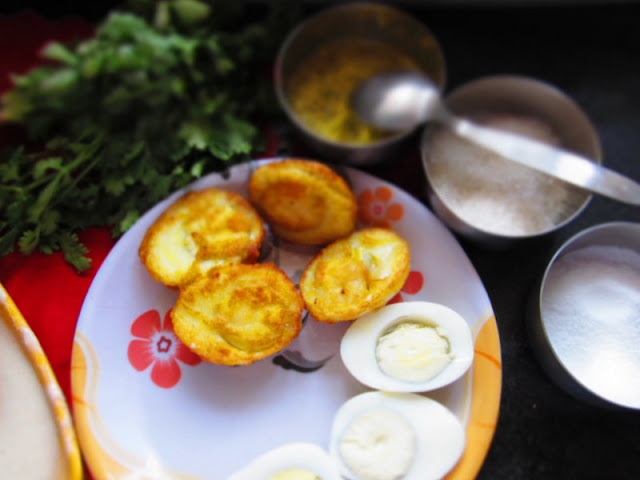It has been raining here lately. Has anybody noticed? :-p The traditional local fare for the season -- and when I say traditional local fare, I mean amongst people who can actually afford a choice of victuals; may their tribe increase -- is khichuri, with a variety of crisply-fried chasers. The favourite at my house is jhurjhure aloo bhaja. Wispy juliennes of peeled potato, marinated in turmeric and salt and deep fried in batches. At my grandparents' household, on the other hand, khichuri was practicable declared inedible without the accompaniment of dimer bora -- seasoned egg-and-flour batter, fried in little pieces -- and ilish machh bhaja, when good ilish graced the market. Our neighbours, on yet another hand, have an inexplicable attachment to potol bhaja. The English word for it escapes me at the moment, so you'll have to do your own research.
But khichuri is a cultural standard. It's a preference I share with my entire community. My family's attachment to dimer jhaal, on the other hand -- eggs in a dry, spicy, mustard gravy -- is a taste shared by few. Indeed, I've seldom heard of this dish being cooked or served at home, and from this I'm tempted to conclude it is something of a rarity.
So, like a magician pulling a rabbit out of a hat, I present to you: dimer jhaal!
Unlike the magician, my rabbits come out roasted.
Serve with boiled rice. Do it now!
But khichuri is a cultural standard. It's a preference I share with my entire community. My family's attachment to dimer jhaal, on the other hand -- eggs in a dry, spicy, mustard gravy -- is a taste shared by few. Indeed, I've seldom heard of this dish being cooked or served at home, and from this I'm tempted to conclude it is something of a rarity.
So, like a magician pulling a rabbit out of a hat, I present to you: dimer jhaal!
Unlike the magician, my rabbits come out roasted.
The ingred. Hard-boiled eggs, shelled and halved. Whole wheat flour mixed with a tiny amount of water, to the left. Fresh coriander leaves/cilantro. Mustard seeds pasted with salt, a teaspoon of sugar, and three green chilies.
Coat the halved eggs in the flour-paste. Just the side with the yolk, mind.
Fry them -- both sides this time -- in a little mustard oil.
See how lovely they look?
In the same oil and wok, stir chopped onions till golden. Then add two teaspoons of the mustard paste.
Cook the mustard paste with the onions till it turns a rich shade of brownish-golden. Add two cups of water.
Gently slide in the fried eggs, one half at a time.
When all the eggs are in, cover the wok. Cook for ten minutes on low, letting the eggs absorb the gravy. Then taste the jhaal for a balance of flavours. Add salt or sugar, if required.
Then garnish it with freshly-chopped cilantro. Give the wok a few stirs, and cover again. Let the coriander infuse.
The utterly delicious dimer jhaal...
Perfectly flavoured to bring this bland, morose weather to life.
Serve with boiled rice. Do it now!










1 comment:
Oh my. That looks delicious!
Post a Comment